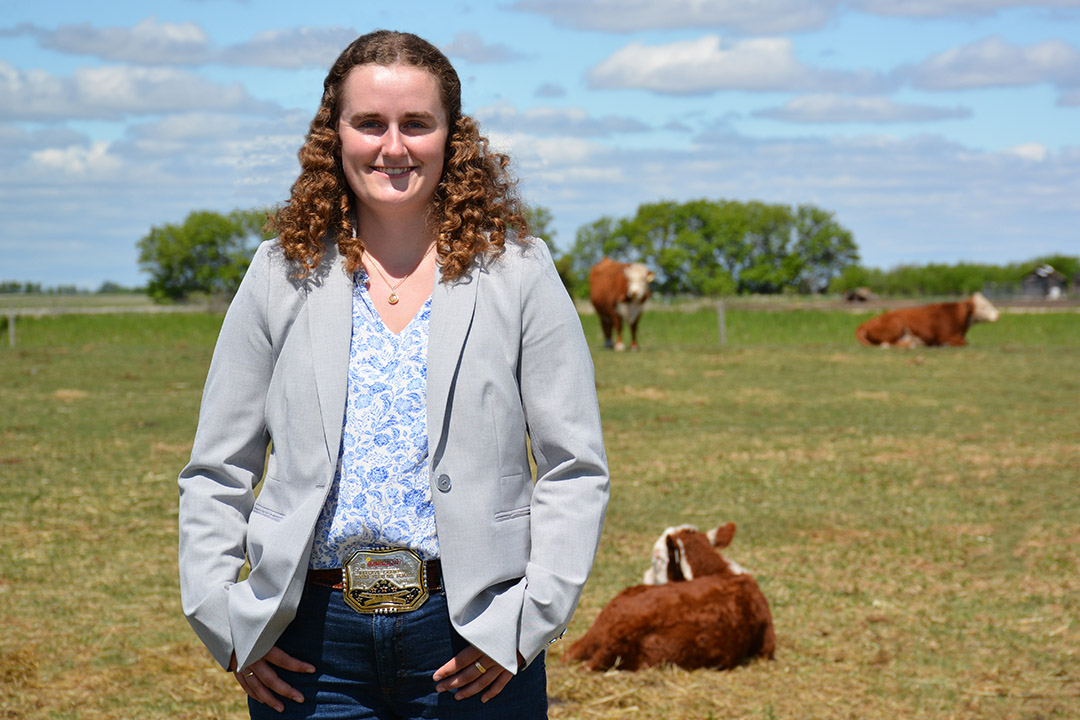
AgBio graduate to receive Governor General’s Silver Medal
Emma Cross has been awarded the highest academic honour for an undergraduate student at the University of Saskatchewan (USask).
By Brett MakulowichWith an outstanding commitment to academic achievement, extracurriculars, research, community, and agriculture advocacy, it’s no surprise that Cross will receive a total of three awards at the upcoming USask Spring Convocation.
Cross will officially graduate with her Bachelor of Science in Agriculture (major in animal science) on June 8 at Merlis Belsher Place.
Her convocation awards include the Governor General’s Silver Medal, the Saskatchewan Institute of Agrologists Gold Medal to Top Degree Graduate in the USask College of Agriculture and Bioresources, and the Christensen Family Graduation Prize in Animal and Poultry Science awarded to the most distinguished graduate with a specialization in animal science.
“I’ve known I would pursue a career in agriculture my whole life,” said Cross. “For years, I planned on becoming a large animal veterinarian, but realized in my first two years of university that I felt a strong sense of purpose in ag communications. I joined the Certificate in Professional Communication program to enhance my communication skills in support of a career in agricultural advocacy and producer extension. My first two years at USask allowed me to discover an adaptable career path that would facilitate an active role in my cattle operation.”

Cross runs her own herd of purebred Hereford cattle under the name Sundance Herefords. Located in Tofield, Alta., she will expand her business upon graduation.
“While I am passionate about ‘ag-vocacy’ and love the communications work I do, I am a rancher to my core and feel that this part of my identity drives what I do in every aspect of life.”
‘Ag-vocacy’ is advocating for agriculture, something that Cross excelled at while balancing her academic studies. Her advocacy works includes being a presenter for the organization Agriculture in the Classroom Saskatchewan, as Cross shared her experience and expertise to elementary school students. She also led agricultural advocacy mentoring sessions for her fellow AgBio students as a capstone project, among numerous other activities.
Currently, she is employed as the stakeholder engagement social media co-ordinator for the Canadian Cattlemen’s Association and also does communications work for the program Verified Beef Production Plus. The goal of these positions is to enhance public trust in Canadian beef production and increase awareness of how cattle are raised.
“Agriculture is a unique industry in that its consumer base truly has no bounds – everybody eats! At the same time, consumers have choices, and to sustain demand for our commodities, we need to make sure our products are trustworthy,” said Cross.
Cross’s advocacy work tied in with her undergraduate thesis, Strategies to Reduce Methane Emissions from Beef Cattle Production Systems. Her thesis was supervised by Dr. Gregory Penner (PhD), professor in the Department of Animal and Poultry Science in the College of Agriculture and Bioresources at USask.
“My thesis focuses on a topic which is becoming increasingly important in global food markets,” said Cross. “To maintain a trusting customer base and resources to support agriculture long into the future, producers are being encouraged to find solutions that balance environmental, economic, and social sustainability.”
“While my research emphasized techniques to enhance environmental sustainability of beef production, I hope that it will serve as a tool to help producers assess their options to choose strategies that work for the economic and social needs of their operations to become better environmental stewards.
It’s a cause close to home for Cross, who in addition to now running her own cattle operation, grew up on one in Southern Alberta. She made the move to Saskatchewan for her post-secondary education based off the reputation of the USask College of Agriculture and Bioresources.
“I chose to attend the College of Agriculture and Bioresources because I had heard excellent feedback about the sense of community and student experience,” said Cross. “The college excited me because of its deep ties to industry and producers in research and its well-known spirit.”
“The lectures and labs I took gave me hands-on opportunities to practice critical thinking, research, and communication skills that will serve me well in my future career.”
The college’s encouragement of participation in extracurricular activities granted Cross numerous opportunities to take on leadership roles, including being the AgBio student representative on both the University Students’ Council and University Council.
“In my opinion, the greatest strength of the College of AgBio is its close-knit community. Students have an opportunity to develop deep friendships that will last a lifetime while pursuing important causes that benefit the broader community.”

